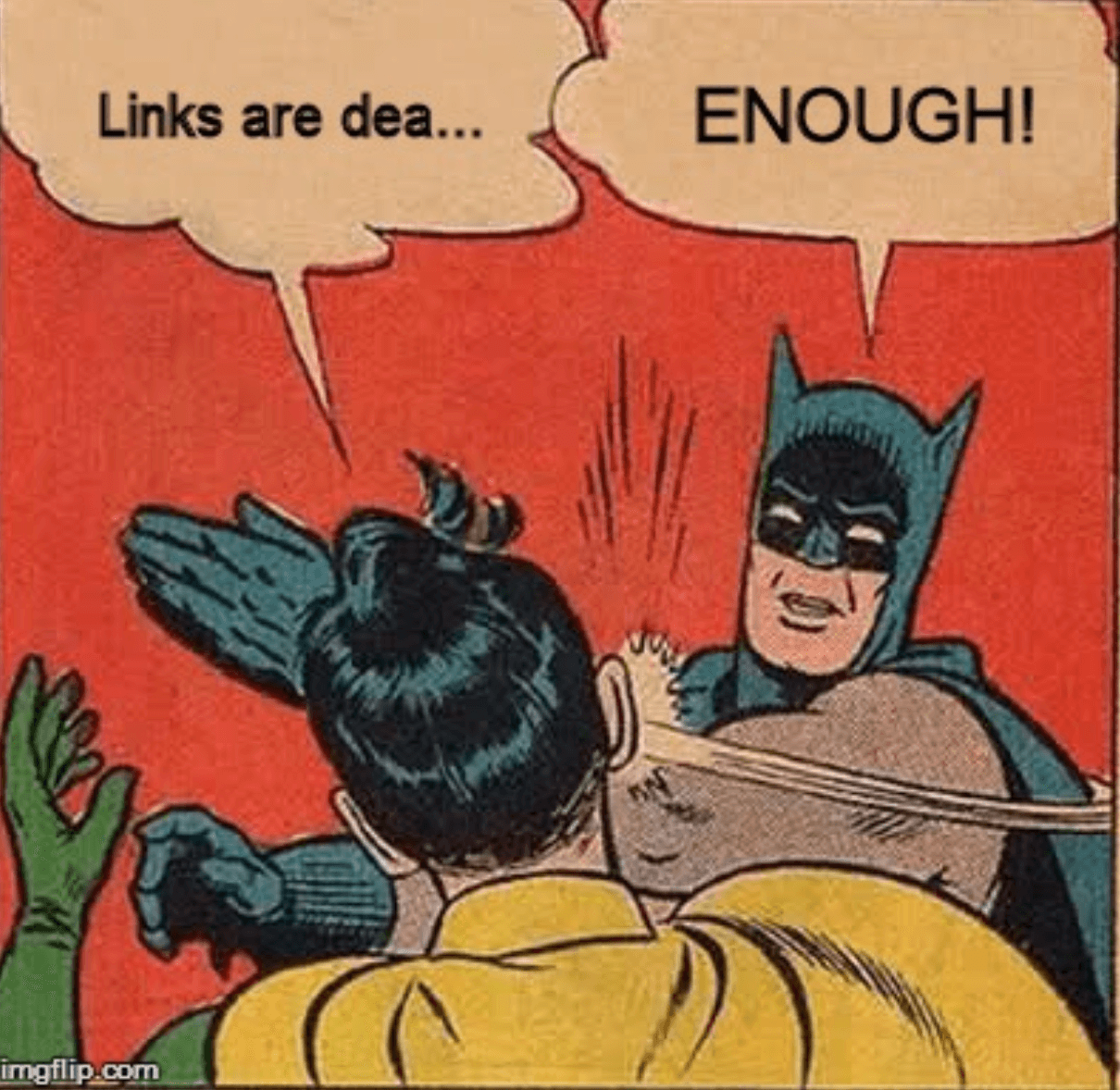Backlinks have long been a crucial component of SEO strategy, often seen as one of the most important factors in achieving high search engine rankings. However, 2024 has seen ongoing debates within the digital marketing community regarding the relevance and effectiveness of backlinks in Google’s ranking algorithm.
In this blog, we’ll examine the importance of backlinks today, discussing whether they are still crucial for SEO success and what truly matters in current and future link-building strategies.
Why Do Backlinks Still Matter in 2024?
Backlinks as a trust signal
Despite numerous changes in Google’s algorithms these past few years, backlinks remain a significant factor in how search engines determine a website’s trustworthiness and authority. High-quality backlinks from reputable sources signal to search engines that your content is valuable and trustworthy, leading to higher rankings.
Here’s a detailed look at why backlinks remain a pivotal trust signal for your business:
- Brand Authority and Traffic: When top-quality websites link to your content, it’s like getting a big thumbs-up for your site’s awesomeness! It’s a powerful endorsement, with established sites vouch for your content’s credibility. Backlinks don’t just boost your SEO; they build up the authority of your brand and, therefore, your business. Being linked from current high-authority sites can supercharge your brand’s credibility and drum up serious referral traffic, even if the links are nofollow.
- Evidence of Improved Search Engine Rankings: Studies by SEO experts, such as those at Ahrefs and Backlinko, highlight that pages with a greater number of quality backlinks generally achieve higher search engine rankings. This is because search engines interpret these backlinks as an indication of valuable and relevant content. Ahrefs found that top-ranking pages generally have at least 3.8x more backlinks than lower-ranking pages.
- Enhanced User Trust: Backlinks from well-known sites also boost user trust. When users see that reputable sources link to your content, they are more likely to view your site as a credible and reliable source of information.
What Factors Affect Backlink Quality?
Not all backlinks are created equal. Links from high-authority domains carry more weight and have a greater impact on your site’s ranking than those from lesser-known or low-quality sites. There are a number of important factors you should consider when looking to increase the quality of your backlinks:
- Relevance: It is essential to remember the importance of the linking site. A backlink from a website within your industry holds more weight than one from an unrelated site. Relevant backlinks show search engines that your content aligns with the user’s search intent, boosting your site’s credibility and authority.
- Authority: Authority refers to the strength and credibility of the linking domain. Tools like Moz’s Domain Authority (DA) and Ahrefs’ Domain Rating (DR) help measure this. High-authority sites pass on more SEO value to your site, significantly impacting your search rankings.
Websites with high authority have a big impact on your search result rankings. Getting links from well-known sources like news outlets or industry leaders is especially helpful. These links can improve your site’s SEO standing.
- Traffic and Engagement: Backlinks from websites with high traffic and user engagement are more valuable. These links not only improve SEO but also generate direct referral traffic to your site, thereby increasing the potential for conversions and user interaction.
- Link Placement: Remember that where a link is placed within a piece of content matters. Links within the main body of the content are more valuable because they are related to the topic and more likely to be clicked by people.
- Anchor Text Diversity: It’s important to have different types of anchor texts in your hyperlinks. This includes using branded, generic, exact-match, and partial-match anchor texts. Diverse anchor text profiles are seen as more natural to search engines. Using too many exact-match anchors can be viewed as spammy and result in penalties.
- Dofollow vs. Nofollow Links: When it comes to links, there are two types you should know about: dofollow and nofollow. Dofollow links pass on link equity, which can boost your SEO, while nofollow links don’t have a direct impact on SEO. It’s important to have a healthy mix of both in your backlink profile. Even though nofollow links may not directly affect SEO, getting them from high-authority sites can still boost traffic and contribute to your website’s visibility and credibility. So, don’t underestimate the power of a good mix of dofollow and nofollow links!
- Link Velocity: This is the rate at which a site acquires new backlinks. A sudden surge in backlinks could set off alarm bells for search engines, hinting at potential manipulative tactics. It’s best to aim for steady, organic backlink growth.
- Context of the Backlink: The idea here is to ensure that the websites linking to your content are relevant to the subject topic. When the content matches up, the links are more useful for people visiting your site and also get more love from search engines.
- Spam Score: This metric assesses a website’s spammy nature. Created by companies like Moz, the score ranges from 0-17, the higher the score, the higher the risk of being penalised by search engines. The score is determined by analysing various factors, such as the quality of backlinks, content practices, and overall website behaviour. It’s important to be cautious about getting links from websites known for spam. These kinds of links can hurt your website’s ranking on search engines. It’s crucial to keep an eye on these links and disavow them to ensure your website has a good reputation.
- Social Signals: Getting likes, shares, and comments on social media is important because it shows that people like and find your content relevant. While not direct backlinks, social signals indicate the popularity and relevance of your content, which can lead to more natural backlinks and improved search rankings.

Debunking Common Myths About Backlinks
Myth 1: “Google No Longer Cares About Backlinks”: A persistent myth is that Google has stopped caring about backlinks and is instead focusing on other ranking factors. In its efforts to broaden its ranking signals and lessen reliance on link-based metrics, Google still considers backlinks to be highly important. They form a key component of a comprehensive strategy that encompasses content quality, user experience, and various other factors.
Myth 2: “All Backlinks Are Equal”: Backlinks have different strengths. Having many weak links holds more value than having many trustworthy, relevant websites. Google’s algorithms can differentiate the quality and relevance of links by considering the context and source of each link.
Myth 3: “Nofollow Links Are Useless”: Although nofollow links do not directly affect search engine optimisation (SEO), they can still offer valuable benefits. Nofollow links can drive referral traffic to your website and help improve brand recognition and credibility. Despite not passing traditional SEO value, many experts consider receiving nofollow links from reputable websites advantageous.
Practical takeaways for your business
- Focus on Quality Over Quantity: Consider investing in acquiring backlinks from high-authority, relevant websites. Engage in guest blogging, generate shareable content such as infographics and videos, and take part in industry roundups and interviews.
- Ethical Link-Building: Avoid shady SEO practices such as buying links or participating in “link farms”. These tactics can result in severe search engine penalties and harm your site’s credibility.
- Diversify Your SEO Strategy: Although backlinks are crucial, they’re only one part of the bigger picture. To nail your SEO game, focus on top-notch, relevant content, technical SEO, optimising user experience, and making sure your site is mobile-friendly. It’s the whole package that counts.
- Regular Audits and Updates: Make sure to consistently review your backlinks to eliminate any harmful ones and adjust your link-building techniques to match the most up-to-date best practices and algorithm changes.
Google’s stance on backlinks
Google continues to emphasise the importance of backlinks while actively trying to decrease the positive impact of websites utilising shady practices to get more links. This is evident from Google’s ongoing reliance on the PageRank algorithm, which evaluates the quantity and quality of backlinks to determine the authority and relevance of a webpage.
Google’s algorithms have also evolved to consider a wider spectrum of signals beyond just backlinks. This means they now take into account such metrics surrounding user engagement, on-page SEO, and content relevance.
While this shift emphasises the significance of these factors, it doesn’t downplay the importance of high-quality backlinks. Instead, it places them in a more comprehensive context of holistic SEO best practices. Currently there is no immediate replacement for the role that backlinks play in Google’s ranking algorithms, making them still relevant in the current SEO landscape.
Final Thoughts
In today’s fast-paced digital landscape, backlinks are still a powerhouse in SEO, but it’s essential to understand their changing dynamics. Top-notch, relevant backlinks are the gold standard for the “digital bat signal” for trust and authority to search engines, ultimately giving your site a boost in rankings and driving organic traffic. However, a successful SEO strategy goes way beyond just link-building and should encompass a rockin’ user experience and top-notch content while following ethical practices.
By tackling the transforming world of backlinks and dispelling common misunderstandings, smart businesses can use backlinks to supercharge and level up their SEO game. Investing in high-quality content, fostering genuine connections, and staying on top of industry best practices are key to keeping your backlink strategy strong and impactful. If you still have questions or need help with your backlink and SEO strategy, contact our SEO wizards at AdVisible. Unlock the power of SEO backlinks with our expert insights, priceless tips, and data-driven strategies.
Let us guide you through the complexity and boost your business. Contact us for a no-obligation chat, and we’ll even include a free digital marketing audit to ensure your website is following the best and most ethical SEO practices.





